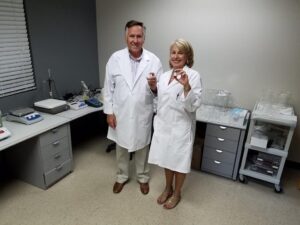Westminster, CO (Michigan News Source) – Once hailed as a “miracle drug” to stop inflammation and potentially save millions of lives, the potential cure, Rejuveinix (RJX), developed by Reven Holdings, Inc., was derailed by government fraud allegations – claims its developers say are nothing more than government overreach by the Securities and Exchange Commission (SEC).
Reven describes RJX as a “revolutionary therapeutic platform, a multi-target, system-level treatment for inflammatory, cardiovascular, and neurodegenerative diseases.” It’s an injectable multi-nutrient combination designed to modulate several inflammation signals to the immune system (cytokines) at once, the way an audio engineer balances a soundboard rather than yanking a single slider. In lay terms, it’s a carefully dosed mix of vitamins and nutrients meant to quiet the body’s inflammatory cascade without the “immune crash” and side effects associated with other treatments like strong steroids.
MORE NEWS: Michigan Awards $350K to Jump-Start Nine Mass Timber Building Projects, Opens New Funding for U.P.
Backed by decades of R&D, 30+ preclinical studies, 2 formal FDA authorizations for clinical trials, 25 granted plus 75–125 derivative patents, and a spotless safety record in Phase I testing, the drug helped propel Reven’s valuation to $6.6 billion and the company secured over $110 million from more than 2,000 investors.
From breakthrough to breakdown.
But just as Reven was preparing to move RJX from promising trials toward the marketplace – and eyeing a public offering – the momentum screeched to a halt. Joe Biden’s SEC stepped in, freezing assets and halting progress, leaving the company, its principals, and its shareholders stunned – and putting RJX in limbo.

Federal regulators alleged that Reven’s top brass – CEO Peter B. Lange, 67, of San Antonio, Texas; President/COO Brian Denomme, 61, of Northville, Michigan; and Director/Chief Strategy Officer Michael Volk, 56, of Broomfield, Colorado – orchestrated an investor scheme, siphoning at least $8.8 million for personal luxuries. The company asserts that third-party forensic accounting evidence disproves the allegations. The company’s leaders also contend that the takedown was driven not by wrongdoing, but by two shareholders who, they allege in court filing “hatched a plot to usurp Reven’s management or intellectual property” and were “actively working…to develop a competing business venture.”
The SEC’s claims, Reven’s rebuttals, deposition transcripts, and other case-related filings from the ongoing litigation in the U.S. District Court for the District of Colorado are publicly available on the company’s website.
Inside Reven’s high-stakes fight for survival.
What follows is the story of how a potential medical breakthrough collided head-on with federal regulators who have what many are calling overreaching and abusive powers – and how the company is now pushing back with RJX in one hand and the Constitution in the other.
All three company principals, together with investor and Vice President of Development Andy White, spoke with Michigan News Source over the Labor Day holiday in an extensive phone interview about their work and the challenges they face. They also went a step further, putting us in touch with their attorneys and shareholders for additional questions.
Clean safety record, broad clinical ambitions.
RJX advanced through years of pre-clinical research, early human testing, and a clean safety record with no adverse effects – moving successfully through Phase 1 trials and progressing three-quarters of the way into Phase 2 studies before the halt, according to company-provided scientific summaries and timelines.
By 2021, Reven says it had dozens of animal studies and published/peer-reviewed articles, protocols, white papers, and Phase 2 progress, and that its valuation was modeled in the billions as it explored a public listing.
Clinically, RJX had always been pitched as a broad platform therapy for conditions driven or worsened by runaway inflammation – from sepsis and COVID-19 complications to chemotherapy toxicities and chronic inflammatory or metabolic disease. The company’s messaging and white papers repeat a consistent hook: RJX is designed to lower multiple inflammatory biomarkers at once, aiming for faster recovery and fewer drug-induced side effects, whether used on its own or alongside standard care.
In its published materials, the company estimated that losing the therapeutic market for the drug – spanning 11 categories and more than 50 diseases – represents a loss of hundreds of billions of dollars over the life of the patents.
Fighting sepsis, COVID and beyond.
RJX has shown particular promise in critical illnesses like sepsis, where unchecked inflammation can spiral into organ failure and death. Though some studies were delayed by COVID shutdowns, investors and physicians alike point to evidence that RJX could blunt the runaway inflammatory responses that make sepsis so deadly, offering a treatment option where conventional therapies often fail.
When the pandemic struck, Reven shifted quickly to test RJX’s potential in COVID-19 patients, where “cytokine storms” mirror the same immune overdrive seen in sepsis. In Phase 2 COVID trials, shareholders say results were “remarkable,” with patients showing faster recovery and fewer complications. While large, randomized trials remain unfinished, those who have seen RJX in action believe it could be a breakthrough therapy if development had not been halted.
The promise of RJX.
The executives put it bluntly: to approximate what RJX does for the body’s metabolic system, a patient would need to take several commercial drugs at once. They repeatedly stressed that the RJX components are nutrients found in food and the body, which they contend explains the favorable tolerability they observed. They added that Reven was the first company to ever bring a vitamin mineral mixture through the FDA process in the history of the FDA.

The company also points to more than a decade of bedside experience alongside the original inventors of RJX in South Africa, particularly in treating lower limb ischemia. According to their accounts, patients often reported noticeable improvements after just a handful of RJX treatments when administered as part of a longer regimen. These observations come from hands-on clinical use and internal experience rather than from independent, peer-reviewed studies where thousands of patients have received the drug under “compassionate care use” in several countries.
Volk said, “We didn’t set out to do this to make billions of dollars. We set out to do this to cure disease, to help people to get the word out that there’s something in the world that these two people in South Africa invented that is beneficial to mankind. And we also knew that, yes, if we did our job, if we were successful, everybody involved would make money. But that wasn’t the primary motivator.”
For the Reven principals, RJX was never just a business plan or a line item on a balance sheet – it was, in their view, a chance to reshape how medicine tackles some of the deadliest conditions linked to inflammation. In our interview with the leaders of the company, one line sums up their posture when White said, “We just want to save lives…and we’ve finally got the product to do just that.”
The science, they argue, was sound, the safety record clean, and the early results compelling. But while the company insists the promise of RJX speaks for itself, the human side of the story is just as telling.
In Part Two of our investigative series, Michigan News Source turns to the shareholders – many of whom became patients themselves and used the drug. They describe what it was like to try RJX firsthand, why they invested their money and trust in the company, and how they see the SEC’s intervention not as protection but as devastation. Their stories highlight why, to them, the loss is more than financial; it’s personal.
